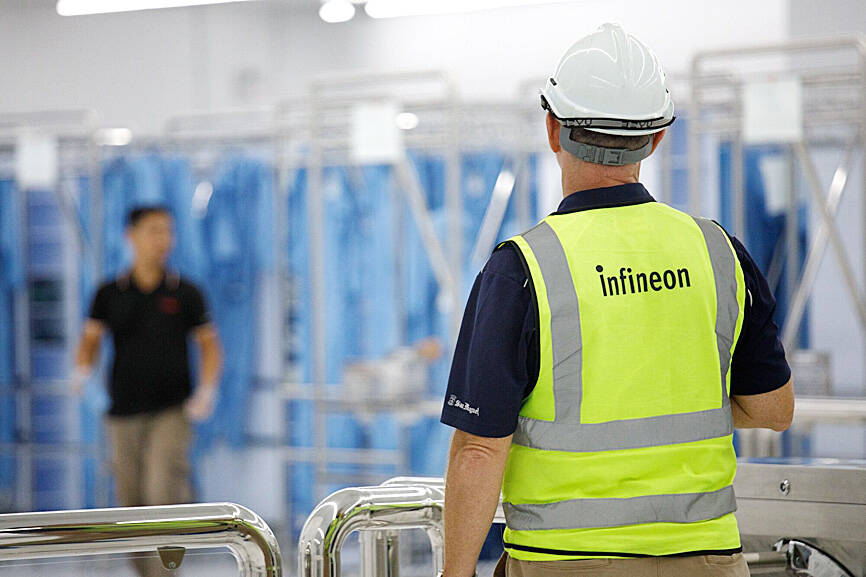Malaysia is gaining more heft in the global supply chain as Infineon Technologies AG opens a major semiconductor manufacturing complex in the country, the Southeast Asian nation’s prime minister said.
“We are now be able to receive and expand the technology. It shows Malaysia is now going up the ladder,” Malaysian Prime Minister Anwar Ibrahim said yesterday at the opening ceremony of the first phase of Infineon’s 7 billion euros (US$7.7 billion) production site in the northern Malaysian district of Kulim.
Anwar highlighted the need for the local governments and universities to help train the necessary talent to better accommodate Kuala Lumpur’s efforts to bulk up the local chip industry. This comes as major governments around the world are spending tens of billions to bolster the domestic production of semiconductors, a commodity that is regarded as one of the most strategic goods for nations to develop emerging technologies.

Photo: Bloomberg
Infineon chief executive officer Jochen Hanebeck said that the new Kulim campus progressed ahead of its original schedule and it would become the world’s largest silicon carbide power semiconductor manufacturing site once the second phase is completed.
The new plant is to focus on making power semiconductors that can help with decarbonization in the automotive, industrial and data center fields. It is expected to eventually create a total of 4,000 jobs, Infineon said.
Infineon’s investments in Malaysia highlight the Southeast Asian nation’s potential to attract more technology investments at a time when major chip firms are seeking alternatives to China and Taiwan for manufacturing given increasing geopolitical uncertainties.
Malaysia has in past years emerged as a global hub for packaging and assembling. Major players including Intel Corp and ASE Technology Holding Co (日月光投控) have taken advantage of its skilled and low-cost labor, and proximity to major markets.

Vincent Wei led fellow Singaporean farmers around an empty Malaysian plot, laying out plans for a greenhouse and rows of leafy vegetables. What he pitched was not just space for crops, but a lifeline for growers struggling to make ends meet in a city-state with high prices and little vacant land. The future agriculture hub is part of a joint special economic zone launched last year by the two neighbors, expected to cost US$123 million and produce 10,000 tonnes of fresh produce annually. It is attracting Singaporean farmers with promises of cheaper land, labor and energy just over the border.

US actor Matthew McConaughey has filed recordings of his image and voice with US patent authorities to protect them from unauthorized usage by artificial intelligence (AI) platforms, a representative said earlier this week. Several video clips and audio recordings were registered by the commercial arm of the Just Keep Livin’ Foundation, a non-profit created by the Oscar-winning actor and his wife, Camila, according to the US Patent and Trademark Office database. Many artists are increasingly concerned about the uncontrolled use of their image via generative AI since the rollout of ChatGPT and other AI-powered tools. Several US states have adopted

A proposed billionaires’ tax in California has ignited a political uproar in Silicon Valley, with tech titans threatening to leave the state while California Governor Gavin Newsom of the Democratic Party maneuvers to defeat a levy that he fears would lead to an exodus of wealth. A technology mecca, California has more billionaires than any other US state — a few hundred, by some estimates. About half its personal income tax revenue, a financial backbone in the nearly US$350 billion budget, comes from the top 1 percent of earners. A large healthcare union is attempting to place a proposal before

KEEPING UP: The acquisition of a cleanroom in Taiwan would enable Micron to increase production in a market where demand continues to outpace supply, a Micron official said Micron Technology Inc has signed a letter of intent to buy a fabrication site in Taiwan from Powerchip Semiconductor Manufacturing Corp (力積電) for US$1.8 billion to expand its production of memory chips. Micron would take control of the P5 site in Miaoli County’s Tongluo Township (銅鑼) and plans to ramp up DRAM production in phases after the transaction closes in the second quarter, the company said in a statement on Saturday. The acquisition includes an existing 12 inch fab cleanroom of 27,871m2 and would further position Micron to address growing global demand for memory solutions, the company said. Micron expects the transaction to